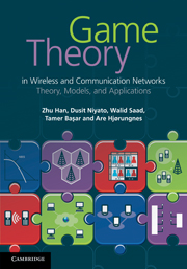

|
Game Theory in Wireless and Communication Networks: Theory, Models, and Applications |
1. The aim of the course |
|
In this course, we plan to address the challenges from the distributed management of wireless and communication networks, through the lens of game theory. Game theory provides a formal framework with a set of mathematical tools to study the complex interactions among interdependent rational players. Recently, there has been a surge in research activities that employ game theory to model and analyze wireless communication systems. The course introduces new frameworks and tools from game theory while providing an engineering perspective. In particular, we will include several topics that cover a diversity of new game-theoretic tools. The material will be useful to a variety of readers, particularly from the wireless communications and networking field. The material from this book can be used to design and develop more efficient, scalable and robust communication protocols. The key features of this course will be: a) A unified view of novel game theoretical approaches for wireless networks. b) Comprehensive treatment of state-of-the-art distributed techniques for today’s wireless communication problems. c) Coverage of a wide range of techniques for modeling, design, and analysis of wireless networks using game theory. d) Identifying the key research issues related to wireless game theory applications. |
2. Textbook |
|
Required: Zhu Han, Dusit Niyato, Walid Saad, Tamer Basar, and Are Hjorungnes, Game Theory in Wireless and Communication Networks: Theory, Models and Applications, Cambridge University Press. |
|
||||||||||||||||||||||||||||||||||||||||||||||||